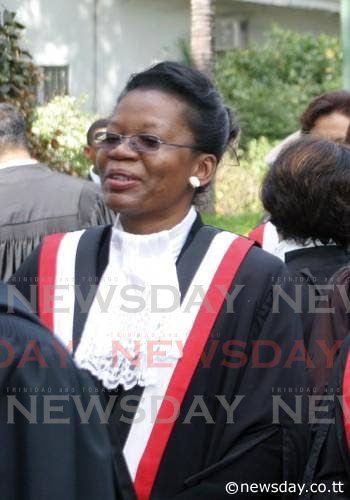High Court throws out doctor's lawsuit against Medical Board

A HIGH COURT judge has dismissed a doctor's judicial review claim against the Medical Board’s (MBTT) policy for specialist registration.
Justice Joan Charles dismissed Dr Sharaz Mohammed’s challenge, ruling that the MBTT acted lawfully when it refused to process his Certificate of Independent Specialist Practice (CISP) application.
Mohammed challenged the board’s refusal to recognise his post-graduate qualifications for specialist certification.
He has been the Registrar at the Port of Spain General Hospital since May 2017 and said the board’s decision to suspend the application for specialist registration under an alternative pathway denied him the opportunity to apply for a CISP although he has the qualifications.
Mohammed’s lawsuit said he was told of a decision by the board’s council to suspend the application for specialist registration under the alternative (Pathway B), until further notice.
“This suspension of Pathway B is also unfair such as to constitutes an abuse of power since the applicant is currently engaging in his examinations for admission as a Fellow of the Royal College of Surgeons. “Pathway B therefore constituted an express representation, that the respondent intends to resile from in breach of the applicant’s legitimate expectation.”
Mohammed’s lawsuit said in 2015, doctors were told they should complete the MRCS (Membership of the Royal Colleges of Surgeons) qualification and submit an application for the registration of an additional qualification for their specialist practice certificate.
The MRCS is an intercollegiate exam. Mohammed received his MRCS qualification and another in urology in 2019.
His lawsuit said the MBTT’s council had the power to make rules or regulations “for determining whether a person is a specialist” under the Medical Board Act. However, it maintained the regulations must be approved by the general membership, not the council, and then approved by the minister before it comes into force.
Mohammed’s lawsuit said the regulations set out the policy for specialist recognition and there was no evidence the policy had changed, downgrading the MRCS qualification.
He said the policy change breached his right to equality of treatment since it unfairly prevented him from registering as a specialist although previous candidates were granted specialist recognition.
In deciding the case, Justice Charles ruled that Mohammed did not provide sufficient evidence that he was similarly circumstanced to those doctors. She found that Mohammed had not yet met the three-year post-qualification requirement necessary under the 2005 Medical Board policy, and by the time he was eligible, the 2017 policy guidelines had replaced the old system.
“He could not have applied for a CISP until completion of three years supervised practice after obtaining the MRCS.
“There was therefore no evidence of a decision by the defendant refusing the claimant’s application for a CISP since none was made; in the circumstances, there is no decision to be reviewed.”
Charles also upheld the 2017 Medical Specialist Register Guidelines, ruling that the MBTT had the legal authority to implement new policies for specialist registration.
She further noted that Mohammed failed to pursue the alternative remedy provided by law, which allowed him to challenge the Board’s decision before a judge in chambers.
In deciding the case, Charles ultimately held, “I agree with the defendant’s submission that Parliament gave the council power to create rules and regulations to determine whether a person is a specialist or not.
“Parliament has given the power to the council, subject to the approval of the MBTT to determine whether a person is a specialist and establishing standards for continuous education and training of medical practitioners.
“The council was thereby given the power to determine what was satisfactory evidence of specialist training and education in order to determine who should be admitted to the specialist register.”
She held the 2017 guidelines were lawful, rational and confirmed to the Medical Board Act.
“The defendant acted fairly and rationally in the exercise of the administrative function given it under the act.
“The adoption of the 2017 guidelines without statutory authorisation by public authorities is permitted and has been approved by the courts.”
She said the 2017 guidelines were not cast in stone but provided a basis to determine who should be on the register.
In dismissing his challenge, the judge ordered Mohammed to pay one-third of the board’s costs.
Mohammed was represented by Jagdeo Singh, Karina Singh and Leon Kalicharan while Rajiv Persad, SC, and Lionel Luckhoo represented the MBTT.

Comments
"High Court throws out doctor’s lawsuit against Medical Board"